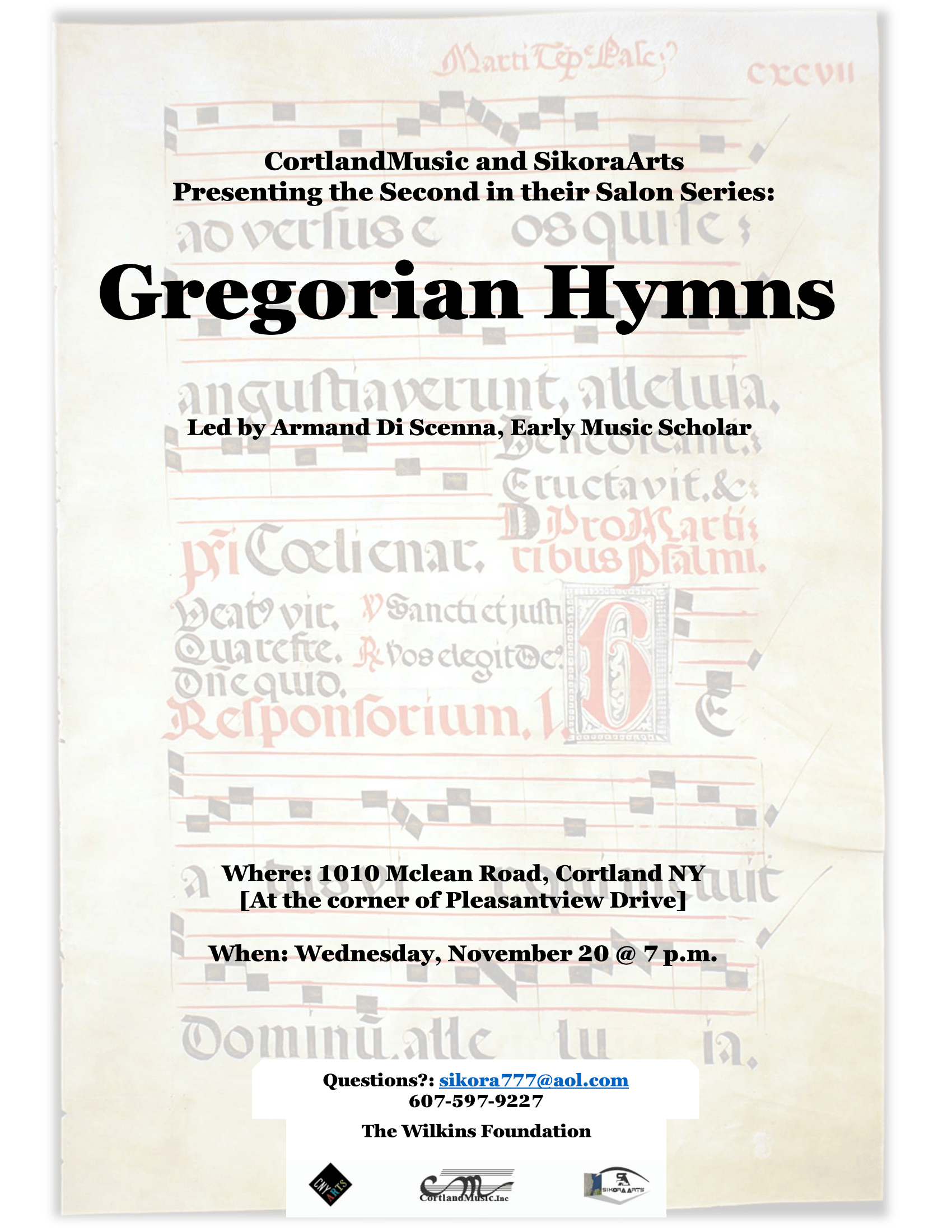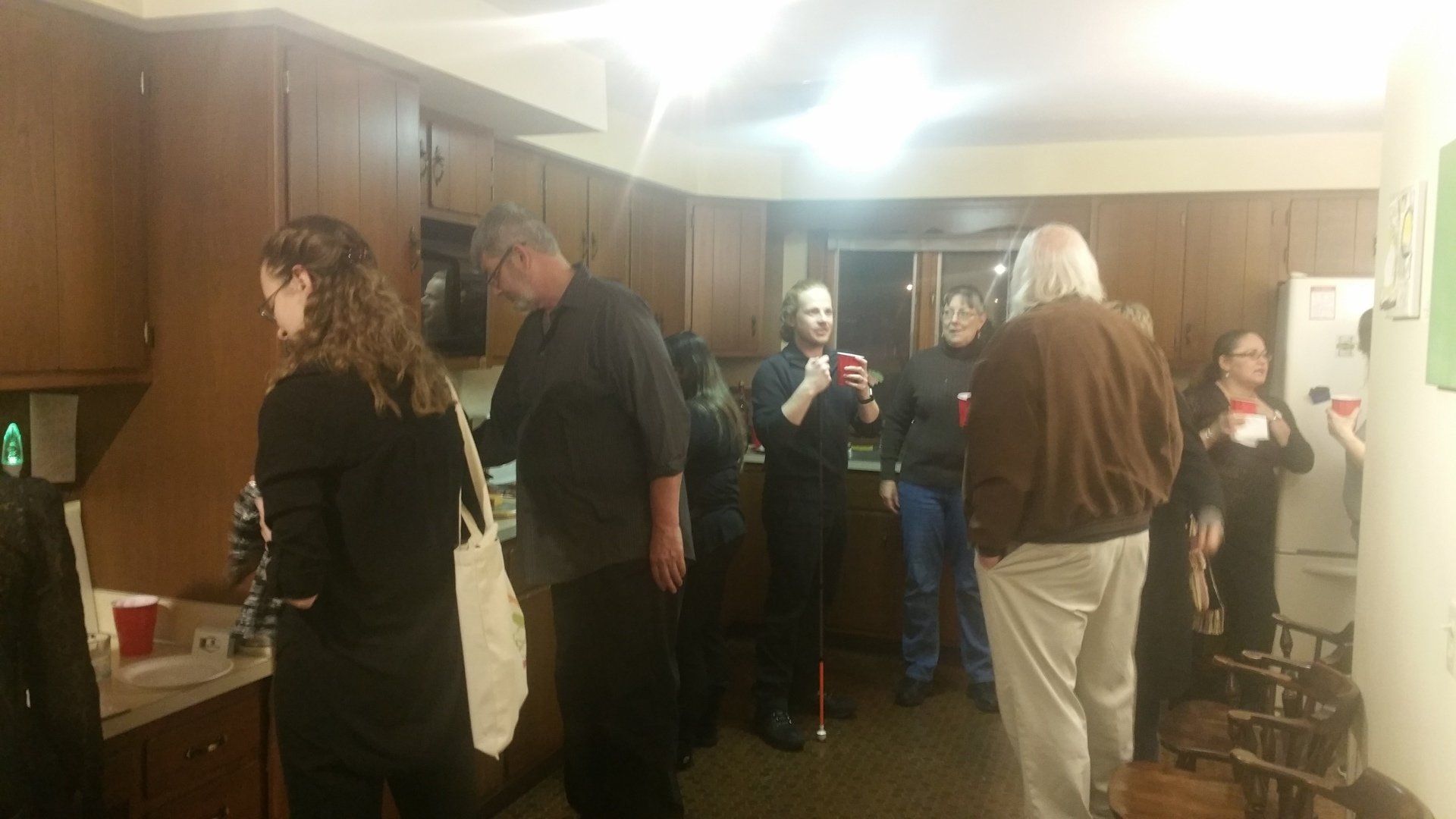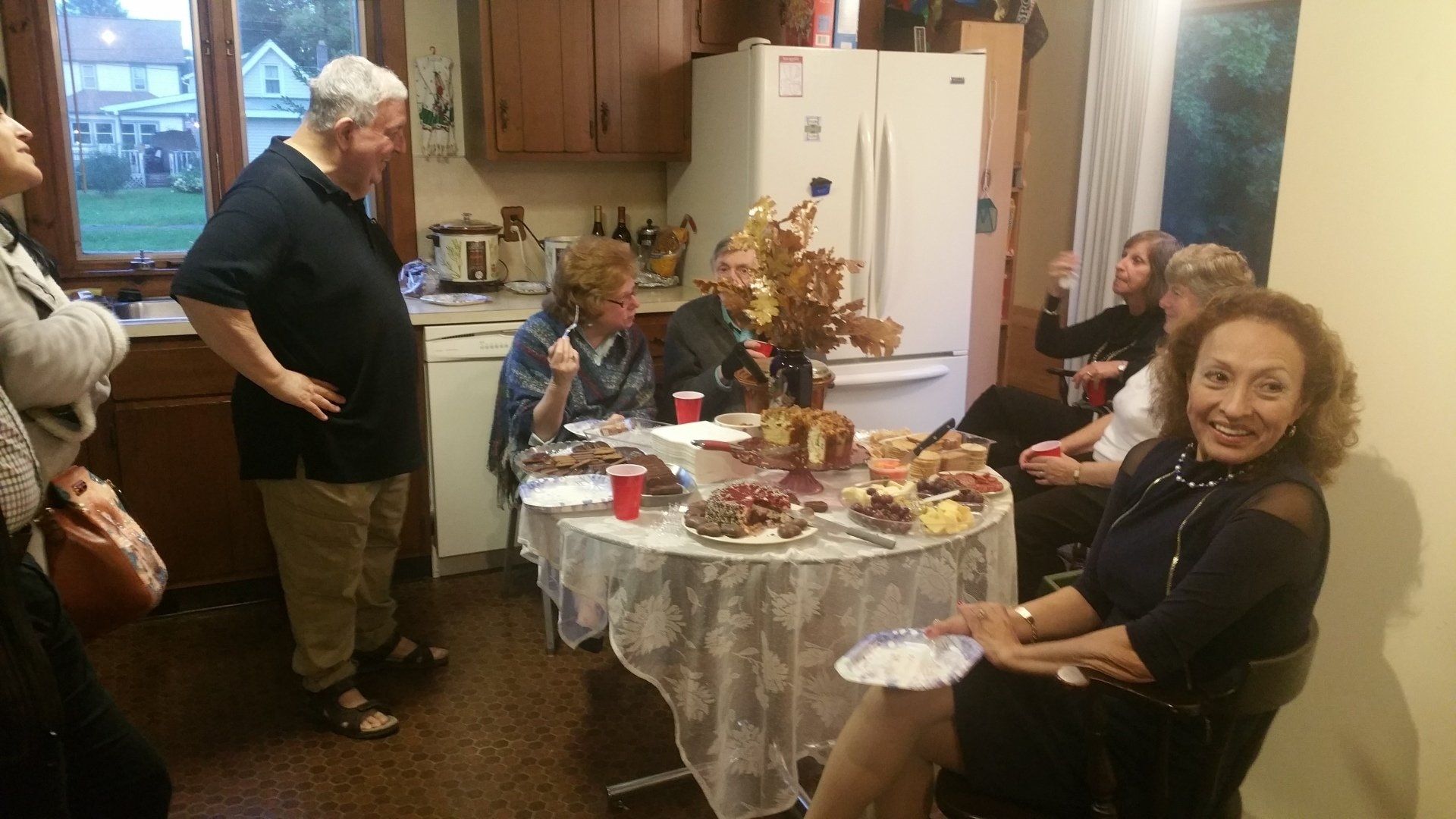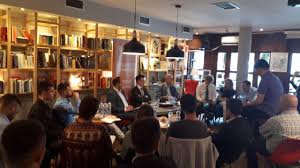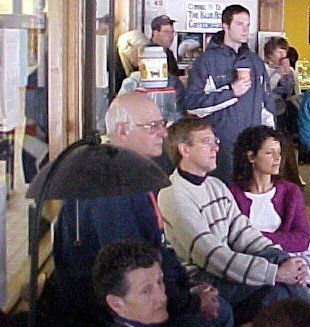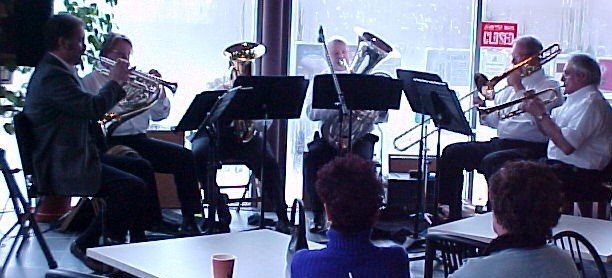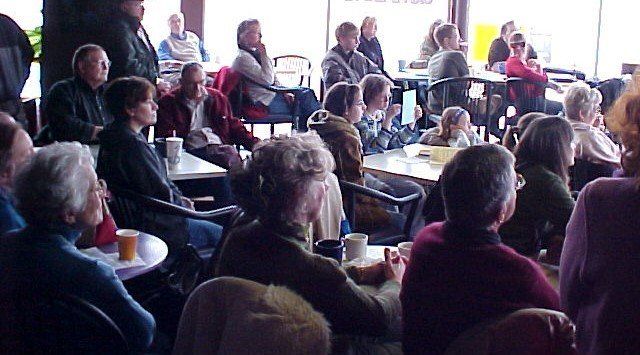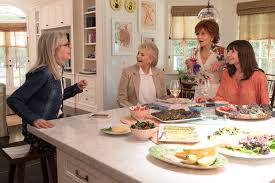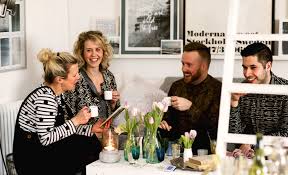SALON (INTELLECTUAL AND ARTISTIC GATHERINGS)
Chanted Gregorian Hymns of
the Roman Catholic Liturgy
This salon will be led by Professor Armand Di Scenna from SUNY Cortland. Armand Di Scenna, Adjunct Professor of Music at the Department of Performing Arts. Di Scena has a long trajectory in the Catholic Church particularly at the Syracuse Diocese where he held the position of Director of the Office of Liturgy and Music. Currently, he is Dean of the Syracuse Chapter of the American Guild of Organists; Music Advisor & Chant Conductor for the 3rd Order Dominicans of the St. Louis Bertrand Chapter, Syracuse, NY; and most recently, for the past thirteen years, Organist, Choir Director, and Liturgist for St. Mary's Church, in Cortland, NY.
At this gathering, Di Scena will explore the chant, monophonic, or unison, used as liturgical music of the Roman Catholic Church. This type of chant was used to accompany the text of the mass and the canonical hours, or divine office. Gregorian chant is named after St. Gregory I, during whose papacy (590–604) it was collected and codified.
WHAT IS A SALON ANYWAY?
Today salons have had a renaissance, perhaps as a pushback against the decline of face-to-face human contact in our digital age. From poetry brunches to multimedia presentations in art galleries to scientific discussions in converted warehouses, these gatherings point to the universal need for personal interaction and mental exercise. They allow people to come together to increase their knowledge and hone their tastes through conversation and the exchange of ideas. Their mission is to allow debate, to stoke passion and to inspire. In a small-semi rural community such as Cortlandville, these kinds of cultural and intellectual exchanges are necessary and important to push the conversation on cultural/educational topics where people of all ages, including youngsters from ages 12 and up can participate.
The attendees to these Salón sessions will be asked to read a passage of the articles to be discussed during the meetings, but people who chooses just to audit the sessions are welcomed too.
Here is the summary of some articles I found on the web regarding the modern Salon and how are they implemented in London and other places in the world:
“In the fall of 2003, California teacher Toby Brothers moved to Paris for her husband’s job. For her, the romance of the move, the thoughts of idling away days along the Seine, were soon overshadowed by the realities of integrating herself into a new culture, learning a new language and settling into a new city. One evening, a chance encounter at a cocktail party led to an in-depth discussion of her passion for teaching and a favorite book—Beloved, by Toni Morrison—prompting a new idea. What do you do, as a literature teacher, to embrace your new environment in one of the world’s most cultured cities? Why, you set up a literary salon. This is Paris, after all.
Hotbeds of creativity and progressive ideas, salons are synonymous with the French Enlightenment. The salonnières most associated with the early days are women such as the colorful Madame Geoffrin, who ran arguably Paris’ most famous salon in the mid-18th century, hosting writers and artists. Women led many of the early salons in Europe, creating an important outlet for voices that otherwise might not have been heard. And women are often the catalysts in the current movement.
Today salons have had a renaissance, perhaps as a pushback against the decline of face-to-face human contact in our digital age. From poetry brunches to multimedia presentations in art galleries to scientific discussions in converted warehouses, these gatherings point to the universal need for personal interaction and mental exercise. They allow people to come together to increase their knowledge and hone their tastes through conversation and the exchange of ideas. Their mission is to allow debate, to stoke passion and to inspire.
“Part of my inspiration was Natalie Clifford Barney,” Brothers tells me, “another American expat who ran what was dubbed ‘the liveliest salon in Paris’ in the first half of the 1900s.” Brothers set up her own salon in Paris before moving again, this time to London. Now, her London Literary Salon is based in her living room, where patrons tackle such weighty authors as Joyce, Proust and Faulkner.
Salons are for the free exchange of any type of stories or ideas.
So, I tell myself, a salon is basically a book club. But I quickly learn that I’m oversimplifying: “We use the literature as a launch pad for deeper discussion,” Brothers explains. “It’s a means to an end rather than the end in itself. The literature is a road map to the bigger questions.”
My first lesson is learned: Salons are for the free exchange of any type of stories or ideas. Some salons marry a literary theme with a broader sense of culture or art. Inspired by an invitation to read from her then-in-progress novel at a SoHo art gallery, New York–based writer Vica Miller set up a multimedia-salon in 2009. Her idea was to emulate the salons of 1920s Paris salonnière Gertrude Stein and those of St Petersburg—a city important in her family background—with writers reading from new work amid contemporary art. “The multimedia component is important to me, as I love such synergies,” Miller says. “People connect on a different level because hearing a good story read aloud against a backdrop of amazing art is a transcendent experience.”
Other salons are completely removed from literature. I recently attended an event at Shoreditch House, a members’ club in a converted warehouse, organized by Salon London. The word “literary” doesn’t feature in its objectives of “Science, Art, Psychology.” Co-founder Helen Bagnall says, “People come from all disciplines and want community and intelligent entertainment.” So what’s up for discussion?
“In some ways, we’re what television should deliver,” Bagnall says. “If a salon works, the audience will hear something they’ve never heard before, pick up a new skill, and go away wanting to find out more.”
By the time the salon starts, some 50 people fill the room, with stools taken from the bar next door and standing room only. The Shoreditch House library seems more like a Lothario’s living room: huge velvet sofas, deep leather armchairs and faded Persian rugs. A zinc-topped table to one side forms the centerpiece of a makeshift but elaborate bar. David Nutt, a professor of neuropsychopharmacology, speaks on what medicines do to the brain. The subject: “The Truth About Drugs.” In the spirit of the salon, he sits, speaking in a conversational manner, inviting comments and questions. While it wasn’t a subject I would have expected for a salon, it was an insightful, witty, often challenging and thoroughly engaging affair, imbued with human interaction, laughter and the frisson of participation. I left energized, enlightened and intellectually stimulated. And I’d learned another lesson: Salons aren’t just a lot of people attending a reading or lecture. Even though modern salons may not be held in private sitting rooms and may be guided by a lecturer, the key is casual interaction and the exchange and growth of ideas.
London salons have become the vogue in recent years, and not simply for emerging writers. At the top of the list, playwright and journalist Damian Barr leads monthly events where established authors read from upcoming works and pitch ideas. The gatherings have gained such repute that they are now attended by the glitterati as well as the literati. Past sessions have featured the likes of David Nicholls, John Waters and Bret Easton Ellis. Barr has taken his literary salon abroad, too, holding events in Moscow and Istanbul. Which leads me to my next realization: Modern salons aren’t held only in Paris, London or New York. (In fact, salons first developed in the Middle East.)
The trendy thing to do after iftar, the breaking of the fast, is to head out to various cafés for literary salons and open-mic reading nights.
The movement is gathering fresh momentum globally. Salons in the 21st century cross borders, languages and even the digital wall. In Dubai, amid a thriving arts and culture scene in the UAE, American expat, blogger and writer Danna Lorch has observed bibliophiles setting up their own discussion groups through Twitter and local literary festivals. “During Ramadan,” Lorch says, “the trendy thing to do after iftar, the breaking of the fast, is to head out to various cafés for literary salons and open-mic reading nights.” Here, the salon culture leans more towards poetry. It’s a tradition in the Middle East that dates back to the Middle Ages, with its recent incumbents led, in part, by Sheikh Mohammed bin Rashid Al Maktoum and his son, published poets who write in both English and Arabic.
Punch and The Poeticians, both run by poets, lead the new salon wave in Dubai. Punch is a short way of saying “poetry bunch.” Lebanese poet Zeina Hashem Beck organizes the monthly event at BookMunch, a Dubai literary café. The Poeticians, founded in 2007 and also active in Amman and Beirut, is “an elastic entity welcoming anyone willing to share bits of their linguistic light with us in English, Arabic or French.” Both groups rely on Facebook for communication. So my next lesson, and perhaps the most surprising, is that yes, salons are about personal, often face-to-face, communication, but they aren’t forums for Luddites. Even if they develop as a reaction against the impersonal qualities of digital culture, today’s salons don’t distance themselves from the digital arena, but embrace it. Digital tools are encouraging salons to form and to grow: connecting people, distributing content, even offering salon events as podcasts.
Of all the salons around the world today, perhaps the Sunday Salon is the ultimate example of how salons are proliferating and reinventing themselves. Started in New York in 2002 by Alaskan Nita Noveno, the salon runs monthly events at Jimmy’s No. 43, a bar and restaurant in the East Village. Like many other salons, it was designed to encourage new writing and allow emerging writers to find an audience. It wasn’t long, though, before a counterpart group was set up in Chicago—and another in Nairobi. Thanks to Noveno’s use of the internet to encourage others to create similar groups, Salon Nairobi emerged in 2007 out of a partnership between Noveno and June Wanjiru Wainaina, founder of Kwani? Readings. Salon Nairobi has grown into quite the literary machine, publishing and distributing content, running festivals, offering tutelage, and making global connections.This leads me to the most important thing I’ve learned about modern salons: In contrast to the aristocratic leanings of earlier salons, today’s groups depend on the principle of equality—of all opinions being valuable and up for discussion rather than attack. This latter point is something that’s often a lot easier to adhere to in face-to-face conversation; think of how much more tempting it is to dismiss an idea in, say, an online comments forum.
Literary salons have emerged for all manner of skill levels. Many offer a nurturing environment that novice writers may not find elsewhere. New York’s Pen Parentis, for writers who are parents, takes place in a hotel bar—with literary ambitions fuelled, presumably, by a much-needed cocktail. The Franklin Park reading series, held at the eponymous Brooklyn beer garden, features “emerging and established fiction writers, memoirists, poets and story-tellers,” highlighting “local talent and authors from around the world.” Lit at Lark showcases local authors in Brooklyn’s Lark café.
The environment may have changed, but the reasons for salons remain the same. “People get inspired,” says multimedia salon founder Miller. “Afterwards, writers have told me, they’ve gone back to their own writing desks to finish manuscripts in progress. Many have said they felt enchanted by the nurturing and creative atmosphere. New friendships are forged as people connect and have conversations on a deeper level, and a couple of writers secured an agent and a publishing deal after reading at the salon.”
The salonnière Madame Geoffrin would be proud.
Invite people from a wide range of backgrounds.
When it comes to hosting a successful salon-and by successful, I mean one with a lot of interesting and varied people better—it’s good to invite a wide range of people. One of the best way to find people is through an existing group such as photography group, book club meet up, etc. (Thanks to the internet, it is easier than ever to find these groups.) Don’t just stick to your usual social groups either.
For example, if you are a photographer and one of the topics you want to discuss is a particular photo or photographer, then just don’t invite other photographers or people you know with a keen interest in photography. Inviting someone who is a writer, scientist, etc. and who knows little or nothing about photography may give an interesting point of view that others haven’t considered.
Make it clear that the people don’t have to be experts or know a lot about a topic to participate. In fact, it can be quite an education to be part of a group discussion you know little or nothing about. (Also make it known that questions are not only acceptable but encouraged.)
From 17th century France and England to the early 20th century, salons flourished as a place where creative people would meet to discuss art, literature, politics and, no doubt, themselves.
We’ve forgotten the art of coming together with intention. We seem to have mastered the cocktail party and the odd dinner party but gathering around a topic has lost its place. In an era when any fact can be attained in a few keystrokes, setting aside time for stories and music and debates can seem quaint and unnecessary.
Earlier generations sought fellowship, argument, and ideas through the concept of salon, just as they valued the sort of entertainment that they could provide for each other.
We could point to readily available media, either for reasons of entertainment, political discourse, or fact-finding as the death knell of the salon, but I think it’s more systemic than that. We have either become hyper-aware of our potential to offend others with differing viewpoints, or we’ve become so overly scheduled that the thought of taking a few hours for conversation can seem like a waste of time.
Once a month I gather my students for a time of discussion and reflection. A time when we seek answers through discourse and conversation. We have discussed the 19th century artist brotherhoods (Nazarenes and the Pre-Raphaelites) one evening, and the Symbolist poets on another. We’ve had rousing discussions over the concept of comparative religion one salon, and the theory of multiple intelligence and the work of Howard Gardner on another.
Interestingly, everyone who hears of our salons immediately responds positively, wishing they could be a part of something like this. I always suggest that they can and should.
Start with a topic: a composer or an era, a painting or a philosophy, and allow the conversation to take its own direction. Send out a series of questions, and most importantly, allow for controversy. Every voice is heard, questioned and celebrated. Egos or checked at the door, and no one is expected to be the smartest person in the room.
If you have the skill and courage to play the latest Sonatina you’ve been scraping through, or a book idea you’ve been mulling over, allow time for this. Start with a question; “Why this piece or work?” “How is this similar to others we know?,” or “What descriptive words come to mind that would best describe your reaction to this music/painting/idea?” Think of this as less of a workshop (there are plenty of those), and more of meeting of minds.
Dress for the event and create a space that feels special and apart from daily routine. Remember this isn’t a cocktail party where people are expected to be charming. This is a time to learn and to share.
Because my students are all musicians, during our monthly salon we have one rule; any topic is fair game except music. This works for a group like this as it allows for the exploration of the unfamiliar. Certainly, other kinds of groups should include music, it’s just that my conservatory students are encouraged to think outside of music if only for one evening a month.
Evening’s topic choices are boundless, but by way of keeping some sort of organization, I encourage my readers to stick to one topic per salon. Turn off all electronics including phones and PDAs, and don’t allow for reference materials of any kind. This will ensure that guests come prepared and ready to discuss, instead of “looking up,” or “Googling.” Set a limit as to the number of guests. I would include no more than 10 and any given salon. Before the event be sure to send out invitations including the topic of the evening.
Prepare a simple menu of finger foods and wine. Let this be a regular feature in your lives, and I am sure you will delight in what emerges through lively debate.





